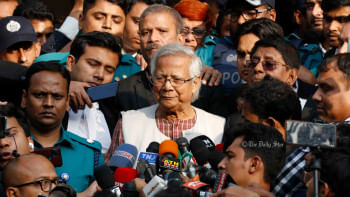Commentary: Yunus the ‘guilty’, let facts speak

"I have been punished for a crime I did not commit. If you want to call it justice, you can."
For the last 15 years and more, Prof Yunus has been accused, judged and found guilty by the highest echelon of Bangladesh's power structure. First, he was accused of being the "bloodsucker of the poor", the "sudkhor". Then when the World Bank suspended the loan for the Padma Bridge, he was identified as the main culprit who personally caused it to happen. Then he was repeatedly called a tax evader for not paying taxes on the fees he receives abroad for his speeches which he brings home under a government scheme that is tax exempt.
For the above accusations never an iota of proof was provided. Yet, the unrelenting vilification continued over the years. There were numerous rejoinders, clarifications and statements from Yunus' side contesting these assertions and stating that he does not own a single share in the 50-odd companies he had set up or takes even Tk 1 as remuneration, fees or benefit in any form. His service is voluntary and pro bono. These protests were never taken any note of.
Who is this Professor Yunus, who has been found guilty of allegedly violating labour laws and has been given a six-month jail term and fined Tk 30,000? He is perhaps among the most respected, most honoured, and most recognised names in the world.
He is the originator of an idea that has taken the development world by storm and helped millions out of poverty in many countries of the world, including the richest and the most advanced. The idea was to give small credits to the poor -- microcredit. Banks as the pillars of the modern capitalist economy exclude the poor as "unbankable" as they don't have any collateral to provide as a guarantee against loans. Microcredit challenged that view and gave funds to those who were poor and had no assets. This opened up a whole new world of credit to the millions around the world who were starved of funds to start their small businesses. He advocated "credit" as a human right. Yunus' women-centric approach in extending microcredit broke social taboos and age-old prejudices, suddenly bringing "poor women" at the centre of fighting poverty. With a credit repayment rate of 97 to 99 percent, they belied all fears of bankruptcy and challenged the repayment rate of even the finest banks in the world, not to mention our banking sector which has been mired in scams, fraud, and loan default culture.
His idea did not end with providing loans to the poor but also taught them how to set up, manage, keep accounts and run their businesses. It turned the poor from being burdens on society to a very productive group. The revolution that we see in rural productivity has a lot to do with government policies but it has an equal, if not more, to do with microcredit that has triggered the entrepreneurial skills of our rural poor.
Simply put, it was two social transformations packed together – one economic, helping the poor, the other social helping poor women, the most deprived of them all.
Having put on the dock the banks of the world, he directly challenged the fundamental notion of modern business whose main purpose is to earn "profit" for its shareholders. Given the extensive income gap and inequality of wealth that modern capitalism has created between the top and the bottom layers of society, Yunus proposed "Social Business" in which the "operation" of business remains the same but its "ethos" focuses on the "social" rather than for only the enterprise. "Profit" here is for the society and not for the individual. This gives modern capitalism the prospect of a new lease of life which may take the world more time to grasp the importance of and, who knows, perhaps earn him a second Nobel.
Prof Yunus can also be credited with foreseeing the role of technology in fighting poverty as exemplified by the use of the famous "telephone ladies" in providing a hitherto unknown type of employment for rural women. His contribution to tele-education, tele-medicine, mosquito repellent nets, low-cost water purification, and many others is immense.
While the world recognises and honours him, we jail him.
Prof Yunus is the recipient of 61 honorary degrees from universities in 24 countries. He has received 136 awards from 33 countries, including state honours from 10 countries. Fortune magazine named him, in 2012, as "one of the greatest entrepreneurs of our time". He was featured on the covers of Time, Newsweek, and Forbes magazines. He is one of only seven individuals in history to have received the Nobel Peace Prize, the United States Presidential Medal of Freedom, and the United States Congressional Gold Medal. A staggering 107 universities in 39 countries have departments, centres or academic activities collectively called Yunus Social Business Centres. On November 23, 2023, Prof Yunus was invited to be the chair of the International Advisory Board of Russia's Financial University. He was given the "Olympic Laurel Award" by the IOC at the Tokyo Olympics and the World Football Summit Award recently in Saudi Arabia. In addition, he worked in an advisory capacity for almost all multilateral bodies, including the UN and private global foundations. He has also been honoured by royalties, including that of several European countries, Saudi Arabia and others.
Combining all the accolades he received on the global stage -- governmental, social, economic and from the worlds of sports and culture -- it may not be wrong to assume that he is at present among the most honoured individuals in the world. And we are proud that he is a Bangladeshi.
This is the man we decided to jail. Why? He is alleged to have violated three labour laws: He did not regularise employees who were hired on contract, he did not create the workers' welfare fund and finally, workers allegedly were not given all their benefits. First, he is the non-executive chair of Grameen Telecom (GTC) and works voluntarily without any remuneration or fee. The contractual recruitment is due to the nature of the company that only works when there is a contract. As for the welfare fund, since it is a non-profit organisation, there is no profit which needs to be shared with anybody including the workers. As for workers' facilities, facts seem to contradict the accusation.
For the sake of argument, let's take the government complaints to be correct. Then the question arises: all these alleged violations of Bangladesh Labour Act (BLA) have specified settlement provisions, so why were they not followed? Why the case, which should have been lodged against the corporate entity, which is the company, is lodged against four individuals? Then there is the clear requirement of the BLA that only the chief inspector (or his authorised person) can file a criminal case which was not done in this case and this non-fulfilment of the requirement itself amounts to a violation of the law.
There is also sufficient vagueness in the BLA that does not clearly define how to deal with "not-for-profit" entities, which GTC is. The BLA took for certain that all companies are for-profit and as such did not have any special provision in the case of "not-for-profit" entities. These are inadequacies of the BLA for which law-abiding citizens cannot be punished.
However, all these fit into a pattern, if we consider the decades of vilification of this one man and singling him out to be punished in this case. A man who has spent his whole life working for the poor and the deprived.
We shout ourselves hoarse about how the world does not give us our due in terms of image. Will this treatment of Prof Yunus help? We want our young to feel proud of our country and yet the person the world honours we hand him jail terms. Will this inspire our youth? We want the world to respect us, yet we do not respect the person that world pays homage to.
Our purpose here was not to plead but only to bring the facts. We hope our higher courts will see how the laws were made to serve a political purpose against the man that the world honours and retrieve the prestige of our legal system in the eyes of the world.

 For all latest news, follow The Daily Star's Google News channel.
For all latest news, follow The Daily Star's Google News channel. 









Comments